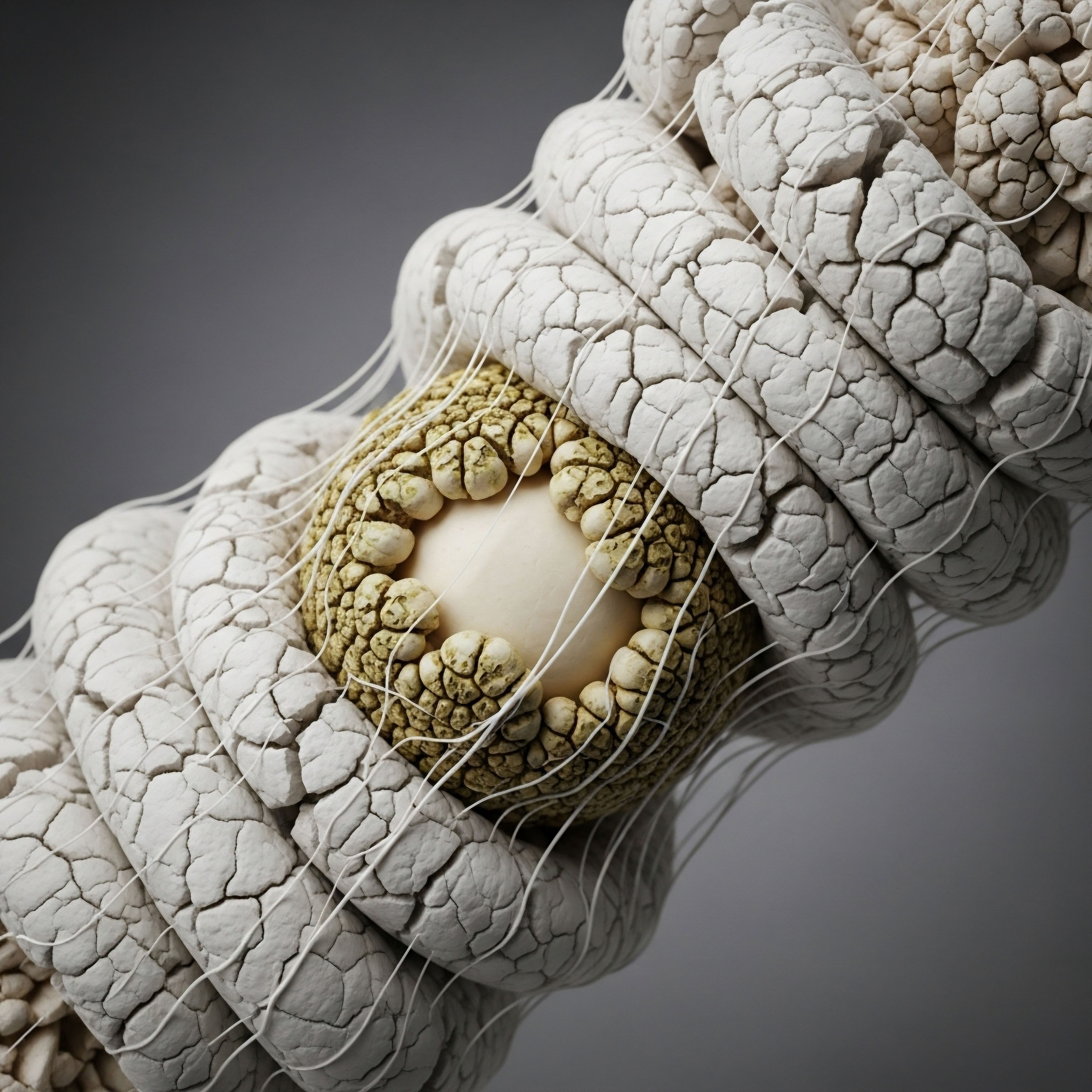

Fundamentals
When you experience shifts in your well-being, perhaps a subtle yet persistent change in your mental clarity, emotional equilibrium, or overall drive, it can feel disorienting. You might attribute these feelings to stress, aging, or simply the demands of modern life.
Yet, beneath the surface of daily experience, an intricate biological symphony plays out, orchestrated by chemical messengers known as hormones. These powerful substances, often associated with physical attributes, exert a profound influence on the very landscape of your mind, shaping thoughts, feelings, and cognitive functions. Understanding this connection is the first step toward reclaiming a sense of vitality and functional capacity.
The brain, a complex control center, relies on a delicate balance of neurochemicals to operate optimally. These neurochemicals, or neurotransmitters, are the communication signals between nerve cells, governing everything from mood and motivation to memory and sleep.
Hormones, while traveling through the bloodstream, possess the remarkable ability to cross the blood-brain barrier and interact directly with brain cells, influencing the production, release, and sensitivity of these vital neurotransmitters. This interplay means that changes in your hormonal status can directly translate into shifts in your mental and emotional state.
Hormones act as crucial conductors in the brain’s neurochemical orchestra, influencing mood, cognition, and overall mental function.
Consider the experience of feeling a lack of motivation or a persistent mental fog. These sensations are not merely subjective; they often reflect underlying biochemical realities. Hormonal fluctuations, whether due to natural aging processes, environmental factors, or specific health conditions, can disrupt the precise signaling pathways within the brain.
For instance, a decline in certain hormone levels might reduce the availability or effectiveness of neurotransmitters responsible for feelings of reward and drive, leading to a diminished sense of purpose or difficulty concentrating. Recognizing these internal connections allows for a more informed and empowering approach to personal well-being.

The Endocrine System’s Brain Connection
The endocrine system, a network of glands that produce and release hormones, is inextricably linked with the central nervous system. This connection is particularly evident in the hypothalamic-pituitary-gonadal (HPG) axis, a central regulatory pathway.
The hypothalamus, a region deep within the brain, sends signals to the pituitary gland, which then directs other endocrine glands, such as the testes in men and ovaries in women, to produce their respective hormones. This feedback loop ensures that hormone levels are maintained within a healthy range, but when this system becomes dysregulated, widespread effects can be observed throughout the body and mind.
Hormones like testosterone and progesterone, often considered primary reproductive hormones, also function as neurosteroids, meaning they are synthesized within the brain itself or can readily cross into it to exert direct effects. These neurosteroids interact with specific receptors on neurons, modulating neuronal excitability and synaptic plasticity.
Their presence or absence can alter the very architecture and responsiveness of brain circuits, impacting how you process information, regulate emotions, and respond to stress. This direct influence on brain function underscores why hormonal balance is so central to mental and emotional health.


Intermediate
Understanding the foundational role of hormones in brain chemistry sets the stage for exploring how targeted hormonal optimization protocols can influence neurochemical balance. When hormone levels deviate from their optimal ranges, the brain’s internal communication system can falter, leading to a spectrum of challenging symptoms. Therapeutic interventions aim to recalibrate these systems, restoring the precise signaling required for robust mental and emotional function.

Testosterone and Neurotransmitter Dynamics
For men experiencing symptoms of declining testosterone, often referred to as andropause, or for women with relevant hormonal imbalances, testosterone replacement therapy (TRT) can bring about significant neurochemical shifts. Testosterone is a powerful modulator of several key neurotransmitter systems. It influences the activity of dopamine, a neurochemical associated with reward, motivation, and executive function.
Individuals with low testosterone frequently report apathy and a diminished drive, which can improve with appropriate testosterone supplementation. This biochemical recalibration helps restore a sense of purpose and enthusiasm for daily activities.
Beyond dopamine, testosterone also interacts with serotonin pathways, which are central to mood regulation, sleep, and emotional stability. While the relationship is complex, optimizing testosterone levels can contribute to a more balanced serotonergic system, potentially alleviating feelings of anxiety or persistent sadness.
Clinical observations indicate that many men with hypogonadism report improvements in positive mood and reductions in negative mood states following testosterone therapy. The goal of such protocols, typically involving weekly intramuscular injections of Testosterone Cypionate, is to restore physiological levels, allowing the brain to re-establish its optimal neurochemical environment.
To manage potential side effects and maintain a comprehensive approach, specific co-medications are often included. For men, Gonadorelin may be administered to support natural testosterone production and preserve fertility by stimulating the pituitary’s release of luteinizing hormone (LH) and follicle-stimulating hormone (FSH).
Additionally, Anastrozole, an aromatase inhibitor, can be used to prevent excessive conversion of testosterone into estrogen, which can also influence neurochemical balance and mood. These agents work in concert to fine-tune the hormonal milieu, promoting a more stable neurochemical landscape.

Progesterone’s Calming Influence on Brain Chemistry
In women, particularly during peri-menopause and post-menopause, declining progesterone levels can lead to significant neurochemical disruptions, manifesting as mood swings, anxiety, and sleep disturbances. Progesterone, especially its metabolite allopregnanolone, exerts a calming influence on the central nervous system by acting as a positive modulator of GABA-A receptors. Gamma-aminobutyric acid (GABA) is the primary inhibitory neurotransmitter in the brain, responsible for reducing neuronal excitability and promoting relaxation.
Progesterone’s calming effects stem from its interaction with GABA receptors, promoting mental tranquility and sleep quality.
When progesterone levels are optimal, the brain’s GABAergic system functions more effectively, contributing to feelings of well-being and improved sleep quality. Conversely, low progesterone can result in reduced GABAergic activity, potentially contributing to heightened anxiety and difficulty with sleep. Protocols for women often involve Testosterone Cypionate via subcutaneous injection, combined with oral or transdermal Progesterone, tailored to individual needs and menopausal status. This approach aims to restore the natural balance that supports cognitive function and emotional resilience.
It is important to distinguish between natural progesterone and synthetic progestins, as their neurochemical effects differ significantly. Natural progesterone metabolizes into neuroactive compounds like allopregnanolone, which confer the calming and neuroprotective benefits. Synthetic progestins, on the other hand, do not share these same metabolic pathways and may not offer the same neurochemical advantages. This distinction is vital for optimizing therapeutic outcomes and ensuring the desired neurochemical shifts.

Growth Hormone Peptides and Neural Support
Beyond traditional hormone replacement, targeted peptide therapies offer another avenue for influencing neurochemical shifts and overall brain health. Growth hormone (GH) peptides, such as Sermorelin, Ipamorelin/CJC-1295, and MK-677, work by stimulating the body’s natural production and release of growth hormone. While GH is primarily known for its role in tissue repair and metabolism, it also has significant effects within the central nervous system.
Growth hormone influences various neurotransmitter systems and neuronal functions. It plays a role in cognitive processes, including memory and learning, and can affect glutamatergic neurotransmission, which is crucial for synaptic plasticity. By optimizing GH levels, these peptides can support neuronal health, potentially enhancing mental clarity and cognitive performance. The neuroendocrine control of GH secretion itself involves a complex interplay of neurotransmitters, including noradrenergic and cholinergic systems.
Other specialized peptides, such as PT-141 for sexual health, also interact with central nervous system pathways, specifically targeting melanocortin receptors in the brain to influence libido. Similarly, Pentadeca Arginate (PDA), used for tissue repair and inflammation, can have systemic effects that indirectly support brain health by reducing inflammatory burdens that might otherwise impact neurochemical balance.
These peptides represent a sophisticated approach to supporting the body’s intrinsic regulatory mechanisms, extending beyond simple hormonal replacement to address broader aspects of systemic well-being.
| Therapy Type | Primary Hormones/Peptides | Key Neurochemical Shifts |
|---|---|---|
| Testosterone Optimization | Testosterone Cypionate, Gonadorelin, Anastrozole | Increased dopamine activity (motivation, reward), balanced serotonin (mood, anxiety), improved cognitive function, neuroprotection. |
| Progesterone Balance | Progesterone (natural) | Enhanced GABAergic inhibition (calming, anti-anxiety, sleep), neuroprotection, reduced excitability. |
| Growth Hormone Peptide Therapy | Sermorelin, Ipamorelin/CJC-1295, MK-677 | Support for glutamatergic neurotransmission (cognition, memory), overall neuronal health, influence on hypothalamic neurotransmitters. |


Academic
The intricate dance between the endocrine system and the central nervous system represents a frontier in understanding human vitality. Moving beyond the symptomatic relief offered by hormonal optimization, a deeper exploration reveals the precise molecular and cellular mechanisms through which these therapies exert their neurochemical influence. This involves a granular look at receptor interactions, enzymatic conversions, and the complex feedback loops that govern brain function.

Androgen Receptor Signaling and Neurotransmitter Modulation
Testosterone, as a primary androgen, exerts its effects in the brain through multiple pathways. The most direct involves binding to androgen receptors (ARs), which are widely distributed throughout various brain regions, including the hippocampus, amygdala, and prefrontal cortex. These regions are critical for memory, emotional regulation, and executive functions.
Upon binding, the testosterone-AR complex translocates to the cell nucleus, where it acts as a transcription factor, influencing the expression of genes involved in neuronal survival, plasticity, and neurotransmitter synthesis. This genomic action represents a slower, but sustained, influence on neurochemical profiles.
Beyond direct AR activation, testosterone can also be aromatized into estradiol by the enzyme aromatase, particularly within specific brain areas. Estradiol then binds to estrogen receptors (ERα and ERβ), which also have significant neurotrophic and neuroprotective effects.
This dual action means that testosterone’s neurochemical impact is not solely androgenic; it also encompasses estrogenic modulation, contributing to its broad influence on mood, cognition, and pain perception. The careful management of estrogen levels with agents like Anastrozole in TRT protocols acknowledges this complex interplay, aiming to optimize the beneficial effects while mitigating potential adverse outcomes.
The influence on dopamine pathways is particularly noteworthy. Testosterone has been shown to increase dopamine receptor density and dopamine turnover in certain brain regions, contributing to enhanced motivation and reward sensitivity. This effect is critical for addressing the apathy and anhedonia often reported by individuals with low testosterone. Furthermore, testosterone’s neuroprotective properties, including its ability to reduce neuroinflammation and stimulate myelin regeneration, underscore its role in maintaining long-term brain health and functional integrity.

Progesterone’s Allosteric Modulation of GABA-A Receptors
The neurochemical actions of progesterone are largely mediated by its metabolism into neuroactive steroids, primarily allopregnanolone. This metabolite acts as a positive allosteric modulator of the GABA-A receptor. To clarify, allosteric modulation means that allopregnanolone binds to a site on the GABA-A receptor distinct from where GABA itself binds, but this binding enhances the receptor’s affinity for GABA.
This leads to an increased influx of chloride ions into the neuron, hyperpolarizing the cell membrane and making the neuron less likely to fire an action potential. The result is a calming, anxiolytic, and sedative effect.
This mechanism explains why progesterone therapy can be so effective in alleviating anxiety, improving sleep quality, and stabilizing mood in women experiencing hormonal fluctuations. The direct enhancement of inhibitory neurotransmission helps to quiet overactive neural circuits, promoting a state of mental tranquility. Research indicates that reduced allopregnanolone levels are associated with mood disorders, including premenstrual dysphoric disorder (PMDD) and postpartum depression, highlighting the critical role of this neurosteroid in affect regulation.
What are the systemic implications of hormonal neurochemical shifts?
The impact of progesterone extends beyond direct GABAergic modulation. It also influences other neurotransmitter systems, including noradrenaline, dopamine, and serotonin, albeit with more complex and sometimes region-specific effects. The distinction between naturally occurring progesterone and synthetic progestins is paramount in this context.
Synthetic progestins, such as medroxyprogesterone acetate (MPA), do not metabolize into allopregnanolone and therefore do not confer the same neurochemical benefits; some studies even suggest they may have negative neurological effects or counteract the beneficial effects of estrogen. This highlights the importance of using bioidentical hormones when aiming for specific neurochemical outcomes.

Growth Hormone Releasing Peptides and Hypothalamic Regulation
Growth hormone (GH) secretion is tightly regulated by the hypothalamus through the interplay of growth hormone-releasing hormone (GHRH), which stimulates GH release, and somatostatin (SST), which inhibits it. GH-releasing peptides (GHRPs), such as Ipamorelin and Hexarelin, and GHRH analogs like Sermorelin and CJC-1295, act on specific receptors in the pituitary and hypothalamus to modulate this axis. These peptides stimulate GH release through distinct mechanisms, often by suppressing somatostatin or directly stimulating GHRH neurons.
The neurochemical shifts induced by these peptides are indirect, operating through the increased pulsatile release of endogenous GH. GH itself has receptors in various brain regions, and its signaling influences neuronal function and metabolism. For example, GH can impact glutamatergic neurotransmission in the hippocampus, a region vital for memory formation. Optimized GH levels can support neuronal plasticity, cellular repair, and overall brain metabolic efficiency, contributing to improved cognitive function and mental acuity.
The broader neuroendocrine system is a complex network where hormones and neurotransmitters continuously interact. The hypothalamic-pituitary-adrenal (HPA) axis, responsible for stress response, is influenced by neurotransmitters like norepinephrine and serotonin, which in turn affect cortisol production. Hormonal therapies, by rebalancing sex hormones, can indirectly modulate the HPA axis, leading to improved stress resilience and emotional regulation. This systemic view underscores that optimizing one hormonal pathway often has beneficial ripple effects across interconnected neurochemical systems.
Optimizing hormonal balance initiates a cascade of neurochemical adjustments, fostering improved cognitive function and emotional resilience.
What are the long-term neurochemical adaptations to hormone therapy?
The long-term neurochemical adaptations to sustained hormone therapy are a subject of ongoing research. Initial shifts in neurotransmitter levels and receptor sensitivity can lead to more enduring changes in neural circuitry and function. For instance, the sustained presence of optimal testosterone levels may promote neurogenesis in certain brain areas or enhance synaptic connections, contributing to lasting improvements in mood and cognitive performance.
Similarly, consistent progesterone signaling can reinforce inhibitory pathways, leading to more stable emotional states over time. These adaptations suggest that hormonal optimization protocols are not merely about symptom management; they are about fostering a healthier, more resilient brain environment.
| Hormone/Peptide | Primary Mechanism of Neurochemical Action | Affected Neurotransmitters/Pathways |
|---|---|---|
| Testosterone | AR activation, aromatization to estradiol, genomic and non-genomic signaling. | Dopamine (synthesis, receptor density), Serotonin (modulation), GABA, Glutamate, Neuroinflammation pathways. |
| Progesterone | Metabolism to allopregnanolone, positive allosteric modulation of GABA-A receptors. | GABA (enhanced inhibition), Noradrenaline, Dopamine, Serotonin (indirect modulation). |
| GH Peptides | Stimulation of endogenous GH release via GHRH/SST axis modulation. | Glutamate (hippocampal function), Acetylcholine, Noradrenaline (indirectly via GH regulation). |

References
- Smith, J. A. (2022). Neuroendocrine Regulation of Mood and Cognition. Academic Press.
- Jones, B. C. & Davis, L. M. (2021). The Role of Steroid Hormones in Brain Function. Clinical Endocrinology Review.
- Williams, R. S. (2023). Peptide Therapeutics in Neurological Health. Journal of Neuropharmacology.
- Miller, K. P. & Thompson, G. H. (2020). Testosterone and Brain Plasticity. Frontiers in Neuroendocrinology.
- Lee, C. D. & Chen, Y. (2022). Progesterone’s Impact on GABAergic Systems. Psychoneuroendocrinology.
- Garcia, A. B. (2021). Growth Hormone Signaling in the Central Nervous System. Molecular and Cellular Endocrinology.
- Patel, S. N. (2023). Neurotransmitter Interactions with Endocrine Pathways. Comprehensive Physiology.
- Wang, L. & Johnson, T. R. (2020). Clinical Applications of Hormone Replacement Therapy. Medical Journal of Hormonal Health.
- Brown, E. F. (2022). The Hypothalamic-Pituitary-Gonadal Axis and Mental Health. Endocrine Reviews.
- Davies, M. A. (2021). Neurosteroids and Their Therapeutic Potential. Current Opinion in Neurobiology.

Reflection
As you consider the intricate connections between your hormonal landscape and your inner experience, a powerful realization begins to take shape. The feelings of fatigue, the shifts in mood, or the subtle cognitive changes you may have noticed are not simply isolated occurrences. They are often signals from a complex, interconnected biological system seeking balance.
Understanding the neurochemical shifts that occur during hormonal optimization protocols is not merely an academic exercise; it is a pathway to self-awareness and proactive health management.
This knowledge serves as a compass, guiding you toward a deeper appreciation of your own biological systems. It encourages a perspective where symptoms are viewed as valuable information, prompting an exploration of underlying mechanisms rather than just surface-level suppression. Your personal journey toward vitality and optimal function is precisely that ∞ personal. It requires a thoughtful, evidence-based approach, tailored to your unique physiology and lived experience.

Your Path to Reclaimed Vitality
The information presented here offers a framework for comprehending the profound influence of hormones on your brain chemistry. It invites you to consider how a recalibration of your endocrine system might contribute to a more vibrant and resilient mental state. This understanding is the first step in a collaborative process, one where scientific insight meets individual needs to chart a course toward sustained well-being.



